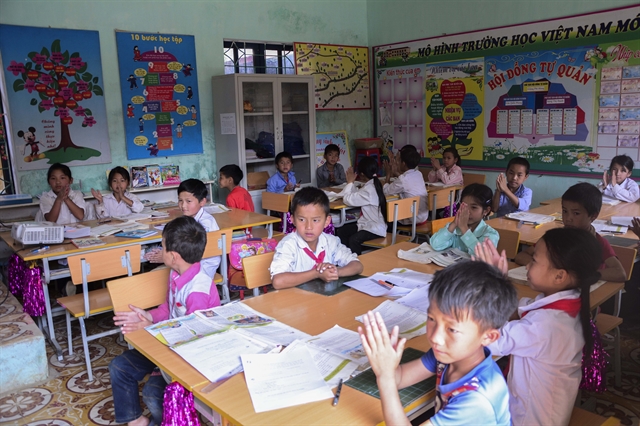 Society
Society

Encouraging children to go to school in some of Việt Nam’s mountainous areas is not easy by any stretch of the imagination.

|
| Students in class at a boarding primary school in Điện Biên Province. In many poor remote districts of the province, teachers and students have to overcome a number of obstacles every day to maintain their teaching and studying work. — VNA/VNS Photo Văn Dũng |
Thu Trang
HÀ NỘI — Encouraging children to go to school in some of Việt Nam’s mountainous areas is not easy by any stretch of the imagination.
It is such a tough task for kindergarten teacher Lường Thị Ngọc, she sheds tears when talking about the lengths she goes to provide an education.
Ngọc, 35, teaches in Tà Té B Village, Nong U Commune, Điện Biên Đông District in the northern mountainous province of Điện Biên.
All of Ngọc’s students are ethnic Mông minorities. They must study in temporary classrooms made from bamboo.
What other schools take for granted, tables, chairs and basic teaching aids, are a luxury in her classroom.
“During winter, temperature falls to below zero degree Celsius and the children have only a thin shirt. They turn blue due to the cold weather,” said Ngọc.
Clothing is not the only issue.
Many don’t have food for lunch forcing the teachers to buy fish and noodles using their own money to feed the children.
Ngọc said that whenever she went to students’ houses to encourage them to go to school, she could not help but feel moved by the stories.
Once Ngọc went to Lầu A Hù’s house, a three-year-old boy. His family lives in a 10sq.m house which comprises of the very bare essentials, a bed and a pot to cook food.
Teachers contributed money to feed Hù in three first days he went to school. But, then, his father asked Ngọc to take Hù home, because he could not buy rice for Hù.
He said that he would bring Hù to the field to search for cassava for their daily meals, said Ngọc.
Tòng Thị Ngân, 37, a teacher of the Chua Ta Kindergarten in Hẹ Muông Commune, Điện Biên District, said that her school did not have electricity, clean water and no signal to make phone calls.
When Ngân wants to call home, she must walk for 2km just to connect.
New hope for teachers, students
The Niềm tin (Belief) volunteer team set up the project “Nuôi em” (Feeding the children) in 2013 to provide lunch for kindergarten and primary students in very poor schools in Điện Biên Province.
Each serving worth VNĐ8,500 (US$0.4).
The project works thanks to contribution from the community.
By last year, more than 5,000 students in the province benefited from the project.
Besides lunch, the project called for people to buy water filter machines and contribute old toys for students.
Teacher Ngọc said after receiving support from the project, Hù’s father agreed to let him go back to school.
At that time, Hù was very pale weighing just 6.5kg. Now he is 11kg.
Giàng A Lếnh, 30, a teacher of the Nậm Nhừ Primary School in Nậm Nhừ Commune, Nậm Pồ District, said when his students had lunch, they were more eager to go to school.
The school has a total of 21 students. After lunch, they take a nap in the classrooms instead of going to streams to fish or searching for bamboo sprout which they had to do in the past.
Sharing Lếnh’s happiness, teacher Sùng Thị Tằng, 26, who works at the Huổi Lích 2 Kindergarten, said her students went to school more regularly thanks to a belly full of food.
“They bring flowers for me on Vietnamese Teachers’ Day. Although they withered wild flowers, it still motivated me to continue working,” she said.
Changing lives
Khúc Thị Hoa Phượng, director of the Women Publishing House, one of the project’s partners, said: “Education, studying and changing awareness are the best way to change people’s lives.”
Translator Nguyễn Bích Lan said thanks to education, her life changed.
Lan suffered from muscle disorder from birth, and many people used to think she would be a burden for her family.
But Lan was determine to self-study English, and become a confident translator.
“I hope with support from the community, students in poor remote mountainous areas can go to school, not only for better meals, but also for their demand for studying and changing their fate,” she said. — VNS




